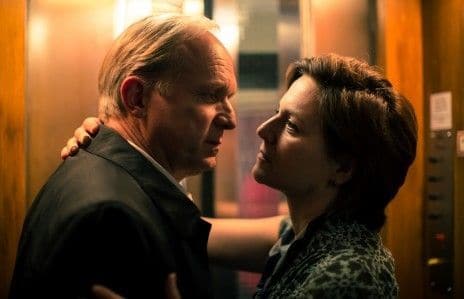Eye For Film >> Movies >> Original Bliss (2016) Film Review
Original Bliss
Reviewed by: Jennie Kermode

Adapted from the novella by Scottish writer AL Kennedy, Sven Taddicken's deceptively simple drama has a distinctly German sensibility. It's anchored by a steadfast performance from Martina Gedeck. Fans of her work may suspect that there's more to her character here than is initially apparent, but she convinces as Helene, a respectable housewife who has been living with something beyond her control for a long time and has only recently become aware of it upon losing her sense of connection to God. As the English title implies, her journey to try to resolve this, though ostensibly focused on romantic possibilities, is in large part about re-evaluating her relationship with knowledge.
In the sudden absence of God, who does one turn to for help? In Helene's case, it's self-help guru Eduard Glück (Ulrich Tukur). Attending one of his events, she gets talking to him and intrigues him sufficiently that he asks to see her later. What might have been a single enjoyable evening together promises to become something more, until Eduard, on an impulse, reveals more of his own character than perhaps he should. His decision plunges Helene into chaos. It underscores the selfishness of her motives; finding somebody with problems of his own was not what she had in mind. But perhaps she already has a more powerful influence over him than she thought, and perhaps there are other areas of life where a bit of selfishness would do her good.

Portrayals of domestic violence onscreen tend to centre on spiral-of-destruction narratives that see returning victims gradually destroyed whilst others crack and murder their abusers. Original Bliss presents something at least as realistic and twice as chilling: an apparently functional marriage in which an attack comes out of nowhere, an abrupt burst of violence which, we can see from context, is not the first. There is no arc to this. It is the status quo of Helene's life, something much harder to escape from.
Her loss of God and the insomnia that plagues her seem to be symptoms of a more general loss of hope. Eduard, meanwhile, is filled with self hatred because of his attraction to degrading pornography. There is a world of difference between experiencing sadistic desires and inflicting them on unwilling people, but his academic rather than personal connection to the world has made it hard for him to see this. Only by observing one another's situations can the two of them come to understand their own.
Are some kinds of knowledge detrimental to us? Eduard blames his studies as a psychologist for what he terms his addiction. His voyeurism is marked by a desire to see every detail; knowledge, rather than physicality, is at the centre of his sexual being. Helene is amused by his assumption that his feelings, rather than the way he expresses them, are shocking to her. Her gender, her class, the way she dresses have conspired to make people assume she is sexless, or at least square. As the story unravels it becomes clear that sexuality doesn't intimidate her, but perhaps other forms of intimacy do, after so long without them.
These complex, sometimes conflicting emotions are beautifully played by Gedeck, who lets us see just enough of the turbulence beneath the surface to keep Helene compelling even when she's going about her day to day activities in a very ordinary way. Helene's superficial calmness is a reminder that victims of domestic abuse are not always recognisable as such. The many small, awkward moments that dot the film, with gazes that linger just a little too long and hesitations likewise, make one almost grateful for the intermittent surges of emotion. Tukur downplays his role, letting Gedeck take up space and, in the process, reminding us that people like Eduard are not always noticeable either. If there's a flaw in the film, it's that Johannes Krisch gets very little to work with as Helene's husband, but perhaps in that case the presence of the id is enough; we don't need to get to know the monsters it contains.
Reviewed on: 18 Feb 2017
















